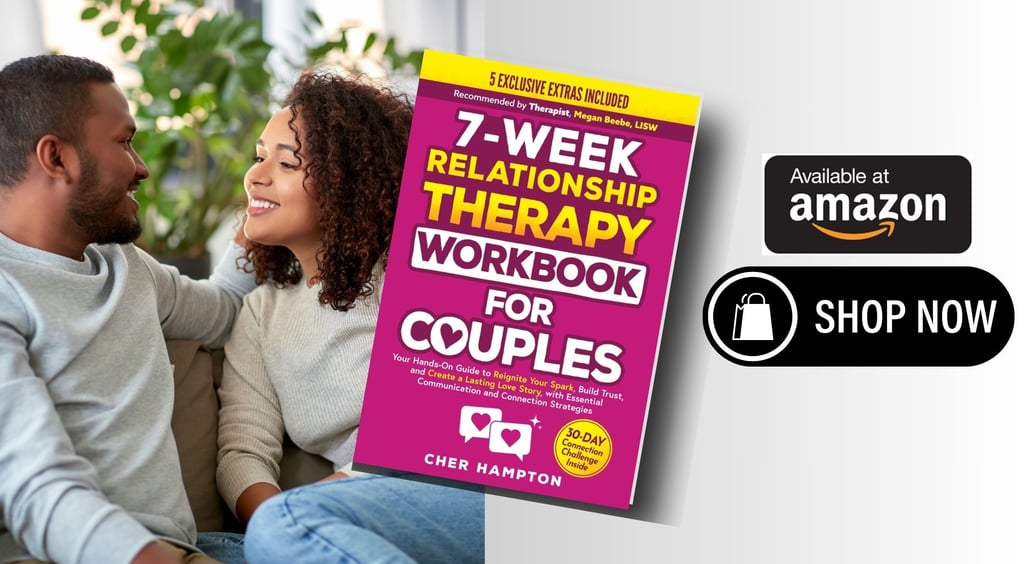What to Do When Your Partner Stops Trying in Your Relationship [2025 Guide for Women]
Learn what to do when your partner stops trying, with simple conversation starters, small shifts, and a focus on growing trust and connection together.
RELATIONSHIPS
Shari Smith
5/8/202514 min read
As an Amazon affiliate, we earn commissions at no extra cost to you if you click our links and make a purchase.


There’s a deep ache that settles in when you feel your partner has stopped reaching for you.
That slow drift—missed texts, empty words, the silence at dinner—often leaves you wondering if you’re the only one holding out hope.
Many women recognize these moments first, sensing the shift in small, unmistakable ways.
If you’re feeling unseen or like your effort goes unnoticed, you’re not alone. This isn’t just about pointing fingers or giving up.
You’ll find practical steps here for reconnecting, setting healthy boundaries, and regaining a sense of self.
My hope is that you’ll come away feeling heard, a little lighter, and more confident about your next step in love.
Recognizing When Your Partner Has Stopped Trying
No one expects love to feel effortless every day.
But when the warmth fades and togetherness becomes a memory, there’s often a quiet realization.
Noticing when your partner has checked out—emotionally or physically—can feel like standing outside in the cold staring through the window of your own relationship.
The first step to healing is noticing those signs, even when your heart wants to look away.
Let’s talk about the warning lights that often show up first, and the deeper reasons why someone starts to drift.


Common Signs of Emotional Withdrawal
Love doesn't usually vanish overnight. It’s the little changes that signal when a partner has stopped putting in the care your relationship needs. Patterns start to speak louder than words.
Here’s what to look for:
Less Communication: The good morning texts are gone. Short answers replace real conversations. Even face-to-face time is filled with awkward silence or distractions.
Avoidance: They find reasons to stay late at work or scroll endlessly on their phone when you’re together. Time that used to be shared becomes something to escape.
Lack of Affection: Hugs and kisses become rare. Simple touching or sitting close is replaced by distance, both physical and emotional.
Increased Irritability: Small things start big arguments. Complaints and criticism take over where laughter and patience once lived.
Disinterest: Your wins, worries, or everyday stories are brushed off. There’s little curiosity about your day or feelings.
When these signs stack up, it’s normal to feel invisible or unwanted. Sometimes, acknowledging the change hurts as much as the silence itself—but you aren’t imagining it.
Why Partners Pull Away: Understanding the Causes
Understanding why your partner has stopped trying can lighten your load of self-blame. Emotional distance almost always has a story.
Often, it comes down to:
Relationship Fatigue: Sometimes love feels heavy. When efforts go unreturned, or when arguments repeat, both partners can get tired of pushing for change.
Stress and Outside Pressures: Jobs, finances, family obligations, or health worries can sap someone's ability to show up emotionally. It’s easy for outside stress to spill into couple time.
Complacency: After the “honeymoon” stage wears off, some partners stop making the little efforts that keep love strong. They assume things will stay solid on autopilot—and forget relationships need fuel.
Emotional Distance: Hurt feelings, trust issues, or words left unsaid can build a wall over time. If emotional pain goes unchecked, it becomes easier for someone to shut down than to open up.
Distraction or Burnout: Being overwhelmed or constantly busy can make caring for a relationship feel like just another task—until it falls off the list.
Each relationship has its own rhythms and reasons, but withdrawal almost always signals a need for care—on both sides.
Naming these causes doesn’t excuse them, but it helps crack the door open to understanding what’s really happening beneath the surface.
Prioritizing Self-Awareness and Emotional Health
When it feels like your partner has left the work of love at your feet, it’s tempting to lose yourself in worry, hurt, and self-blame.
You might wonder what you did wrong or start second-guessing every word you’ve said.
It’s not only your connection at stake—it’s your peace of mind and sense of self.
Before you can pour energy back into your relationship or make decisions about the future, you need to care for your own emotional well-being.
This is where self-awareness and emotional health come front and center.
Let’s walk through ways to manage your reactions and hold onto your self-worth, even when things feel shaky.


Managing Your Response and Expectations
Emotional reactions—like anxiety, frustration, and self-doubt—arrive fast when someone you love pulls away.
Your mind might race, searching for answers or blaming yourself for problems you can’t see or fix. Here’s the truth: those feelings are normal.
They tell you that something important to you feels at risk.
When emotions run high, your thoughts can get loud. You might find yourself stuck in loops of negative self-talk or holding yourself responsible for your partner’s choices.
To break the cycle:
Name your emotions. Give yourself permission to notice what you’re feeling—sadness, anger, confusion, even relief. Recognizing feelings is the first step toward calming them.
Practice gentle self-talk. When you catch a harsh thought (“I’m not enough” or “I’m ruining things”), pause and ask if you’d say the same thing to a friend. Replace blame with kinder truths, like “This hurts, but I’m doing my best.”
Avoid taking full responsibility. Relationships are a two-way street. If your partner has checked out, remember it’s not yours to fix alone.
Let yourself feel without acting right away. Emotional jolts don’t always need fast solutions. Sometimes the best thing you can do is sit with your feelings, breathe, and allow them space instead of rushing to mend what’s broken.
Trust that your reactions make sense. You’re responding to something real. It’s okay to need comfort and grounding before you try to solve deeper relationship problems.
What If the Happiest Couples Aren't Just Lucky? Discover Their Timeless Secrets to Transform Your Relationship In Just 7 Weeks! 💖
If you’re tired of feeling distant and don't want to give up on your relationship, this hands-on guide byAmazon Best-Selling Author, Cher Hampton, is exactly what you need right now!
💞 Simple & Practical 7-Week Guidance + Over 45 Therapist Recommended Techniques
💞 5 Exclusive Tools Included
💞 2025 Updated Cover and Content
Setting Boundaries and Maintaining Self-Worth
When someone stops trying, it’s easy to shrink or start accepting scraps of attention, thinking that any connection is better than none.
But your self-worth doesn’t have to ride the waves of someone else’s effort. Setting boundaries is how you protect your heart.
To honor your own value during this difficult time:
Decide what behavior you won’t accept. That might mean not tolerating name-calling, emotional stonewalling, or being ignored for days at a time.
Communicate limits clearly. Let your partner know—without blame—how certain actions make you feel and what you need instead. You might say, “When I feel shut out for days, it hurts. I need communication, even when things are hard.”
Stand firm, even if it’s uncomfortable. Boundaries aren’t about punishing the other person—they’re about keeping yourself safe. You teach people how to treat you by what you allow.
Don’t settle for disrespect or continued neglect. Remind yourself: love should not mean losing your voice or tiptoeing around someone else’s moods.
Keep up with activities and friendships that fuel you. Whether it’s yoga, painting, coffee with friends, or long walks, keep the pieces of your life that make you feel whole and strong.
Self-worth flourishes when you put your needs on equal footing with anyone else’s.
Even if the relationship feels off track, you have the power to choose how you are treated.
And sometimes, the most loving act is refusing to shrink just to keep a bond alive.
Opening Up the Conversation with Your Partner
You might feel like your words will float into silence, or your feelings will meet a wall instead of a warm hand.
Starting a real conversation after your partner pulls away takes courage, even on the softest days.
But honest words—and the space they open up—can shift everything.
Here’s how to set the stage for connection, step beyond blame, and share what you truly feel.


Choosing the Right Time and Approach
Not every moment is built for tough talks. Timing and setting are your best helpers when you want to be heard.
Picking a quiet evening instead of a rushed morning, or saving the conversation for after the kids are in bed, can make a world of difference.
When you talk, try to sit side by side or go for a walk together.
Sometimes sharing your thoughts while moving or not looking each other straight in the eye makes it easier to open up without feeling exposed.
The tone you use sets the stage. A gentle voice invites listening; a sharp or rushed tone can put up walls before you’ve even begun.
Start from a place of calm, not when you’re already upset or when your partner is distracted.
Being kind with your words—even when you’re hurting—shows you value the relationship enough to protect it while being honest.
Before you jump in, pause and check in with yourself:
Are you feeling ready to talk without letting anger take the lead?
Is your partner able to give you their full attention right now?
Do you have the privacy to speak freely?
Choosing the right time doesn’t guarantee an easy talk, but it gives your words the best chance to land softly.
Effective Communication Techniques
How you share matters just as much as what you say. If you want to reach understanding, not an argument, a few grounded tools can help:
1. "I feel" statements
Put the focus on your feelings instead of your partner’s faults. It stops conversations from slipping into finger-pointing.
Try saying, "I feel lonely when we don’t talk after work," instead of, "You never listen to me anymore."
2. Active listening
True listening is more than waiting for your turn to speak.
It's about pausing, making eye contact, and letting your partner finish without cutting them off.
Show you're really hearing them by nodding or repeating back what you’ve heard.
For example: "So you’re saying you’ve been stressed at work and it’s hard to switch off when you get home?"
3. Open-ended questions
Asking questions that invite sharing instead of yes-or-no answers can draw your partner out. The goal is to understand their side, not just to make your own case.
"How have you been feeling about us lately?"
"What helps you feel more connected to me?"
4. Keep blame off the table
Aim for curiosity, not accusations. If things get tense, take a break or agree to check in later.
Remind yourself: the goal is connection, not winning.
Don’t worry if the conversation feels messy or you don’t walk away with all the answers. What matters most is showing up with honesty and care.
Small, sincere efforts add up—and can bring you closer, even when things feel uncertain.

How to Communicate without them feeling Attacked!
Watch Video...
Collaborative Solutions and Next Steps
Once you’ve had the hard conversations and taken a look inward, it’s time to think about moving forward together—if that’s what you both want.
Relationships rarely fix themselves on their own.
Change sticks when both people show up.
These next steps can help you build something new out of what feels worn or tattered.
Let’s talk about how you and your partner can sort out what you need, find common ground, and keep your hearts close while working through the bumps.


Identifying Relationship Needs and Shared Goals
Every relationship finds new life when both people can say what they truly want.
If you’re feeling disconnected, this is a good moment to step back and ask yourself: what do I need now?
Maybe your heart longs for simple things—a soft touch, honest talks, more laughter, or just to feel important again.
Write those thoughts down, no matter how small.
Invite your partner into this conversation.
Share your needs while asking them about theirs.
This isn’t a battle for the loudest voice—it’s two people laying out hopes, even if they aren’t the same. Focus on:
Expressing clear needs: “I need more time with you after work,” works better than, “You never care anymore.”
Asking open questions: “What would help you feel more loved in our relationship?”
Looking for overlap: Circle the needs and wishes that match. Those are good places to start rebuilding.
Make a short list of two or three shared goals.
They might be as simple as eating dinner together twice a week or taking a walk every Saturday.
Starting small can spark bigger changes.
Rebuilding Connection Together
If love is a garden, it needs more than sun and rain—it needs both of you tending the soil. Bringing back effort can shift the whole feel of your home and your hearts. Here are ways to strengthen your partnership connection:
Make space for small rituals.
Share morning coffee, cook a favorite meal, or read together before bed.
Plan regular “us” time.
Choose one day a week for something fun—no phones, no work talk.
Surprise each other.
Leave a note, text a sweet memory, or do a household chore without being asked.
Be physically close.
Hold hands, hug often, or sit together while watching a show. Sometimes touch rebuilds bridges words can’t.
Share new experiences.
Try something new together—take a class, visit a park, or even just walk a different route in your neighborhood.
Celebrate progress.
Name the good things out loud. A simple, “I really liked our walk yesterday,” shows effort and lifts the mood.
Not every day will feel amazing. But small, shared actions do more than grand promises. Relationships grow strong on daily kindness and attention.
When to Consider Professional Help
Sometimes the two of you give all you can, and it still feels like you’re stuck or speaking different languages.
If old hurts keep popping up or talks always end in the same fight, it might be time to get some extra support.
Couples counseling or relationship therapy isn’t just for marriages on the brink.
Think of it as building a stronger house—sometimes you need a guide to help find the cracks and patch them together. Therapy can:
Give both partners equal voice in a safe space.
Teach new ways to talk and listen without blowing up.
Help untangle issues that feel too heavy or complicated to unpack alone.
Offer hope and new options for moving forward, even if you decide to go different ways.
If it feels hard to bring up, start simple.
You might say, “I think we’ve both been hurting and I don’t want us to get stuck here. Would you be willing to talk to someone together?”
Remind your partner that asking for help is an act of hope, not a sign of failure.
You’re choosing your relationship, not giving up on it.
These steps can’t promise a perfect ending. What they can do is clear the weeds, rebuild trust, and light up new paths—together or apart.
Choose the ones that fit your life and move at a pace that feels right for both of you.
Knowing When To Let Go and Move Forward
Sometimes the toughest truth is the one we least want to face.
After long talks and honest tries, you might find the balance tilting in just one direction.
If your partner keeps stepping back, you may wonder how long you should stay or how much more you can give.
Moving forward—on your own—can feel scary but also brings a quiet kind of hope.
This is about honoring yourself, even when your heart wants to hold on.


Assessing Your Long-Term Happiness
It’s easy to get stuck carrying the hope that things will return to how they used to be.
But clinging to a relationship that leaves you feeling unseen often chips away at your spirit.
When the same patterns keep repeating and your effort is met with silence, it’s time to check in with yourself.
Ask these questions gently, as if you’re talking with your closest friend:
Does this relationship match my core values?
Am I respected—by my partner and by myself?
Do I feel safe to be honest and real, even on the hard days?
Is my energy mostly spent on worrying, fixing, or hoping for change?
When I picture the next year, can I imagine feeling freer or lighter, if things stayed as they are?
Notice the answers that make your chest tighten or your stomach drop. Sometimes our bodies tell the truth our minds don’t want to admit.
If you find yourself losing sleep, giving up your own joy, or shrinking to fit someone else’s distance, your happiness might need a new path.
Remember, honoring yourself is not selfish. You are allowed to want warmth, kindness, and reciprocity.
A relationship should add color to your life—not drain it away. Letting go can be a way to say yes to what you truly deserve, even if the next step feels uncertain.
Steps Toward Healing and Independence
Ending a relationship—especially one where you’ve poured your heart in—can feel like you’re setting out on your own in an unfamiliar city.
The ache is real, but so is the possibility of new comfort. Healing takes time and care, but it always starts with small, loving choices.
Here are ways to begin:
Acknowledge your feelings.
Allow space for grief, anger, relief, or confusion. The storm of emotions will settle. There’s no need to rush or judge what comes up.
Reach out to your support circle.
Call a friend, family member, or therapist—even if it’s just to say, “I’m not okay today.” Sharing your feelings helps break up the loneliness.
Set boundaries for contact.
It’s okay to take a break from talking. If you need space to mend, say so. Some people write a short note or text, giving themselves permission to rest and regroup.
Rediscover your own routine.
Bring back small pleasures—your favorite tea, a walk in the sun, music that lifts you up. Old rituals can feel like an anchor during uncertain days.
Write down what you’ve learned.
Even painful chapters teach us about what we want, what hurts, and what helps us grow. Journaling can clear your head and reveal patterns you want to change.
Dream again.
Let yourself imagine new experiences, no matter how tiny. Sign up for a class, plan a trip, or try a new restaurant. Each fresh choice is a gentle way to reclaim your story.
Healing isn’t a straight line. Some days you’ll feel lighter, and others heavy with questions. Give yourself grace for both.
Over time, you’ll find you are stronger and braver than you thought.
Moving on isn’t the end of your story—it’s the first page of a new one that puts your own happiness back at the center.
Letting go is not about giving up. It’s an act of trust—in yourself, in your worth, and in the future waiting to greet you.
Conclusion
Every relationship has seasons—times of closeness, times of distance, and sometimes, stretches where you’re the only one reaching.
If your partner has stopped trying, your first steps—recognizing withdrawal, caring for your own well-being, speaking your truth, and exploring new paths—are acts of courage.
Each choice you make, whether it’s working together to rebuild or gently letting go, honors your worth.
You deserve love that feels steady, attentive, and real. No matter how things unfold, remember that you’re not defined by someone else’s effort.
This is your story too. Give yourself grace as you turn each page, and know that hope can live even in the most uncertain hearts.
If this helped or spoke to you, share your thoughts below or pass it on to someone who needs it. Thank you for trusting yourself enough to read this far.




